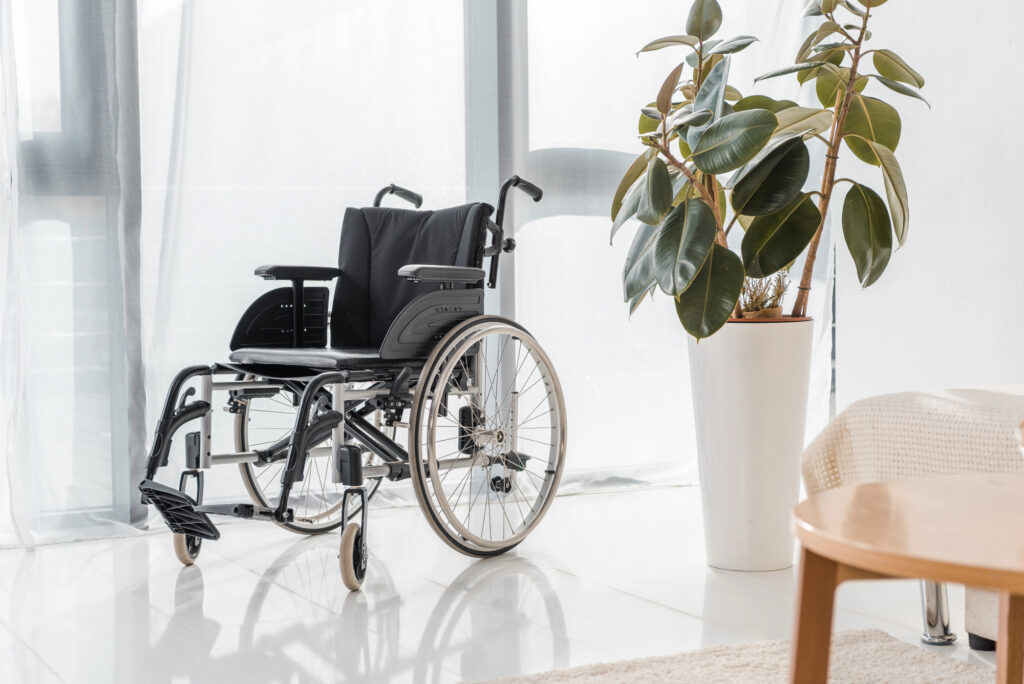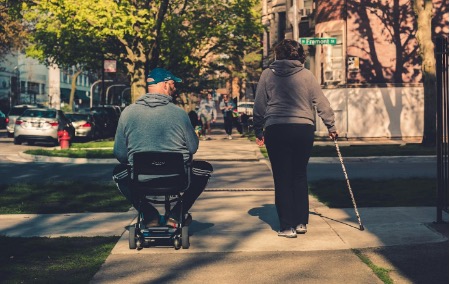Exploring the Psychological Impact of Mobility Assistance Devices

We often take many things for granted: among other things, the ability to experience the world through our senses, the joy of life’s simple pleasures, and the freedom to move around at will. Let’s focus on that last one.
While we might not think twice about it, many people live with disabilities that make moving freely a challenge. Thankfully, mobility assistance devices are there to help them regain that sense of freedom. Besides their obvious physical benefits (which we’ll also briefly mention), the psychological impact of mobility assistance devices on the person using them is also immense and can’t be understated. Today, let’s explore just how transformative these devices can be!
What are mobility assistance devices?
Mobility assistance devices (often called mobility aids in official government documents) are like trusty sidekicks that help people move around when their bodies are in need of some extra support.
Whether we are talking about a cane, crutches, a wheelchair, or even a stair lift, these gadgets give individuals – especially those with disabilities, injuries, or age-related challenges – more independence and confidence. They are highly beneficial in providing a level of mobility comparable to unaided walking or standing and can even qualify for tax concessions.
According to the National Council on Aging, over 6.8 million Americans use mobility assistance devices: about 1.7 million of these people use wheelchairs or scooters, while the other 5.1 million use canes, crutches, or walkers.

What kind of mobility assistance devices exist out there?
Mobility assistance devices come in various forms to assist with movement: canes (offer balance, help distribute weight, and reduce strain on the legs), crutches (shift weight from the legs to the upper body; they’re ideal for those recovering from leg injuries or surgeries), walkers (provide a stable frame to support those with limited mobility or balance issues), regular and standing wheelchairs and powerchairs (enable mobility for individuals who can’t walk or need to avoid putting weight on their lower limbs), mobility scooters (battery-powered devices with handlebars; they’re great for those with limited upper body strength or endurance), and guide dogs (specially trained to assist visually impaired individuals in safely navigating their environment).
Of course, one also shouldn’t forget safety modifications like ramps and handrails, as they allow easier access and navigation across different heights and surfaces, particularly for wheelchair users or those with other mobility challenges.
Exploring the psychological impact of mobility assistance devices
Okay, the previous section briefly covered how each mobility device helps the user physically, each in its own way. However, they all share a common psychological benefit: they help eliminate various mental health challenges and psychological pain.
People with disabilities are generally more vulnerable to mental health issues, such as anxiety and depression, due to the added struggles they face every day. Luckily, there are many amazing providers of mental health services that are accessible throughout the country. A great example is a facility like Time Wellness Arkansas, which provides custom-made care designed for each patient’s specific needs. With a highly educated staff, supportive housing, and evidence-based therapies, centers like these can offer the type of support that can make a solid difference in improving mental health.
Now, let’s consider how mobility assistance devices can provide psychological benefits and help prevent various mental health conditions associated with living with a disability.
Mobility assistance devices help build/regain self-confidence
Many people with disabilities find it challenging to regain the confidence they had before their condition, particularly if their disability resulted from an injury or illness. This (sometimes sudden) loss of confidence can be a major concern; it can greatly impact their self-esteem. However, mobility assistance devices can play a crucial role in helping them maneuver their environment more freely.
These devices enable easier movement and enhance the users’ ability to participate in daily activities; they help individuals view themselves as equals to those without mobility challenges. Improved mobility can significantly boost their confidence and overall quality of life.
Mobility assistance devices help foster a (renewed) sense of independence
It’s not that hard to imagine that relying on others for mobility can be profoundly challenging, leading to a significant loss of independence for many individuals with disabilities. Thankfully, mobility assistance devices have evolved to help people regain and strengthen their autonomy.
These advanced devices enable users to move freely and confidently through their environments. With various options available, including canes, crutches, wheelchairs, and mobility scooters, among other things, individuals can find the right aid to match their needs, thus fostering a renewed sense of independence.
Mobility assistance devices enable face-to-face social interaction
What would we do without our friends and loved ones? The joy of face-to-face interactions, rather than relying solely on phones or laptops, is, well, invaluable. Mobility assistance devices offer individuals with disabilities the chance to fully engage in these meaningful moments. These devices help bridge the gap between virtual and in-person connections, making it easier for them to join in on activities and social events. With greater mobility, people can more freely meet up with friends, enjoy spontaneous outings, and create cherished memories without the constant need for others to come to them.

Certain mobility devices boost cognitive function
Lastly, it’s worth noting that certain mobility assistance devices can also enhance cognitive function. Devices such as standing power chairs allow users to stand up, improving circulation and, consequently, mental processes like memory and concentration. Additionally, prolonged sitting or lying down can lead to muscle fatigue and atrophy. By enabling users to stand and engage their muscles more frequently, these devices help mitigate fatigue and promote overall physical and mental well-being.
Conclusion
While relying on mobility assistance devices may initially seem to have a negative psychological impact, it’s important to recognize that these devices actually play a crucial role in helping individuals with disabilities live as normally as possible. By facilitating easier movement and greater independence, they prevent social isolation, which could otherwise worsen their condition and mental health. Ultimately, the psychological impact of mobility assistance devices is profound and, when viewed in this context, can be overwhelmingly positive.
References:
https://www.medicalnewstoday.com/articles/318463
https://www.ncoa.org/adviser/medical-alert-systems/mobility-friendly-travel-guide
Recent Articles
- 5 Inspiring Audiobooks for Wheelchair Users
- Exploring the Psychological Impact of Mobility Assistance Devices
- The Role of Power Wheelchairs in Enhancing Quality of Life for Parkinson’s Patients
- Comparing Electric Power Standing Wheelchair and Electric Power Elevated Seat
- From Hospital to Home: Transitioning with a Power Chair
Categories
- Benefits
- Caregiving
- Cerebral Palsy
- CRT Power Wheelchair
- Disabilities
- Disabled Person Care
- Durable Medical Equipment
- Electric Wheelchairs
- FAQs
- General
- Healthy Eating
- Healthy Weight for Wheelchair Users
- Maintenance
- Medicare / Insurance
- Multiple Sclerosis
- Muscular Dystrophy
- News
- Parenting
- Power Chairs / Wheelchairs
- Press Releases
- Product Features
- Redman News
- Safety & Tech Tips
- Sleep Hygiene
- Spinal Cord Injury / Paralysis
- Standing Wheelchairs
- Teaching Compassion to Non-Disabled Children
- Testimonials
- Travel
- Travel Destination for Wheelchair Users
- Wheelchair Fitness
- Wheelchair on a Plane
- Wheelchair Summer Activities
- Wheelchair Travel Tips
- Wheelchair User Support Systems & Resources
